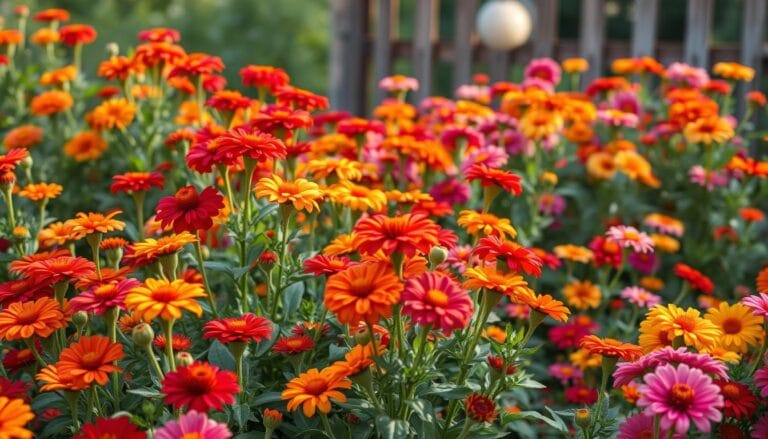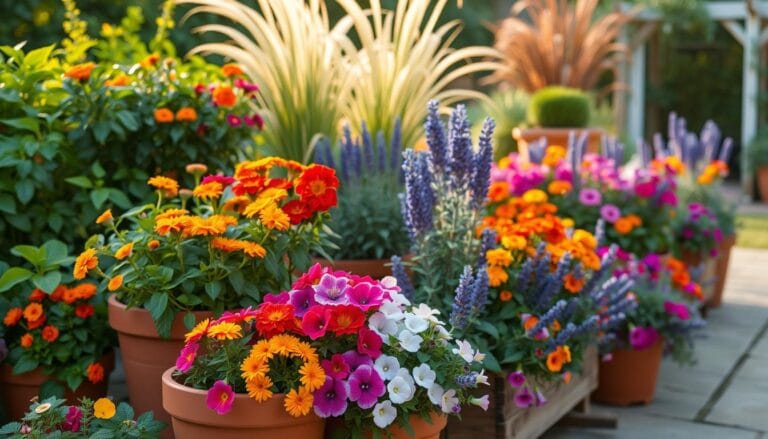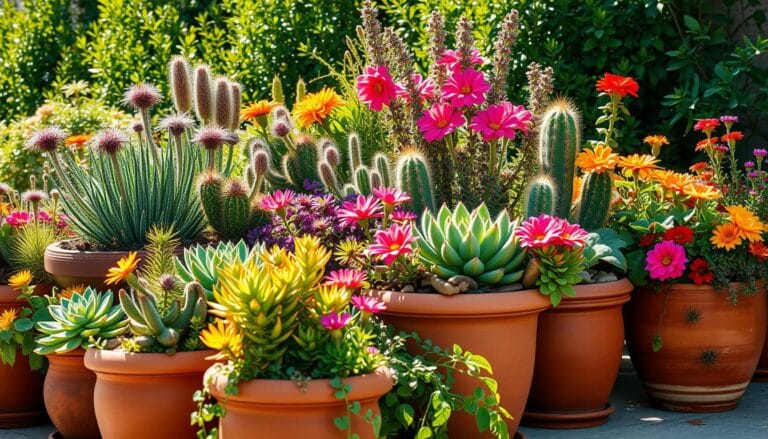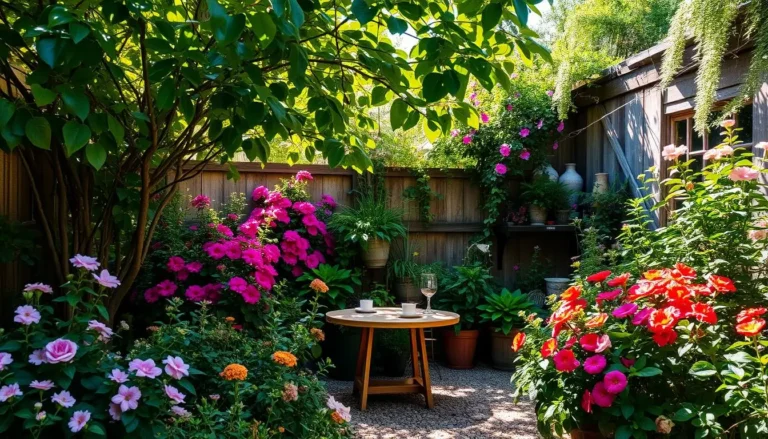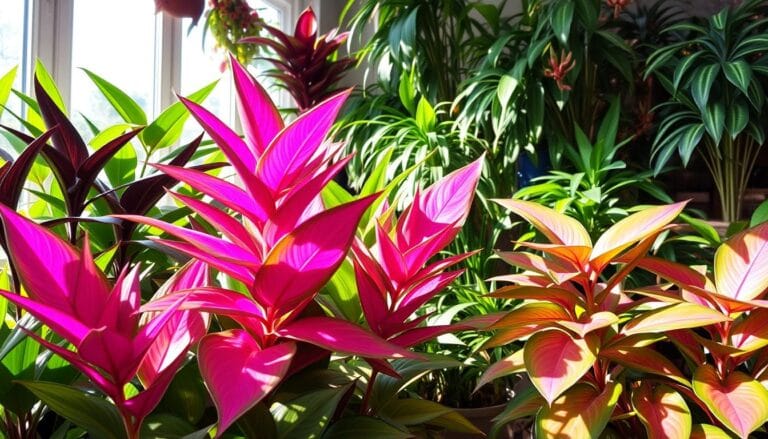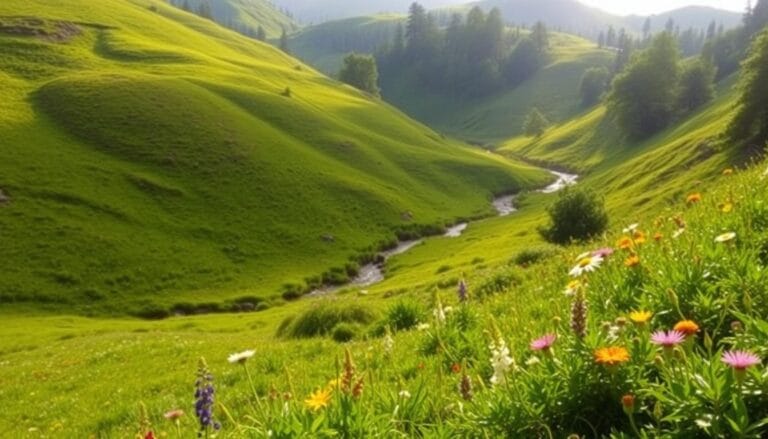Best Flowers for Organic Mulch in Georgia Winters
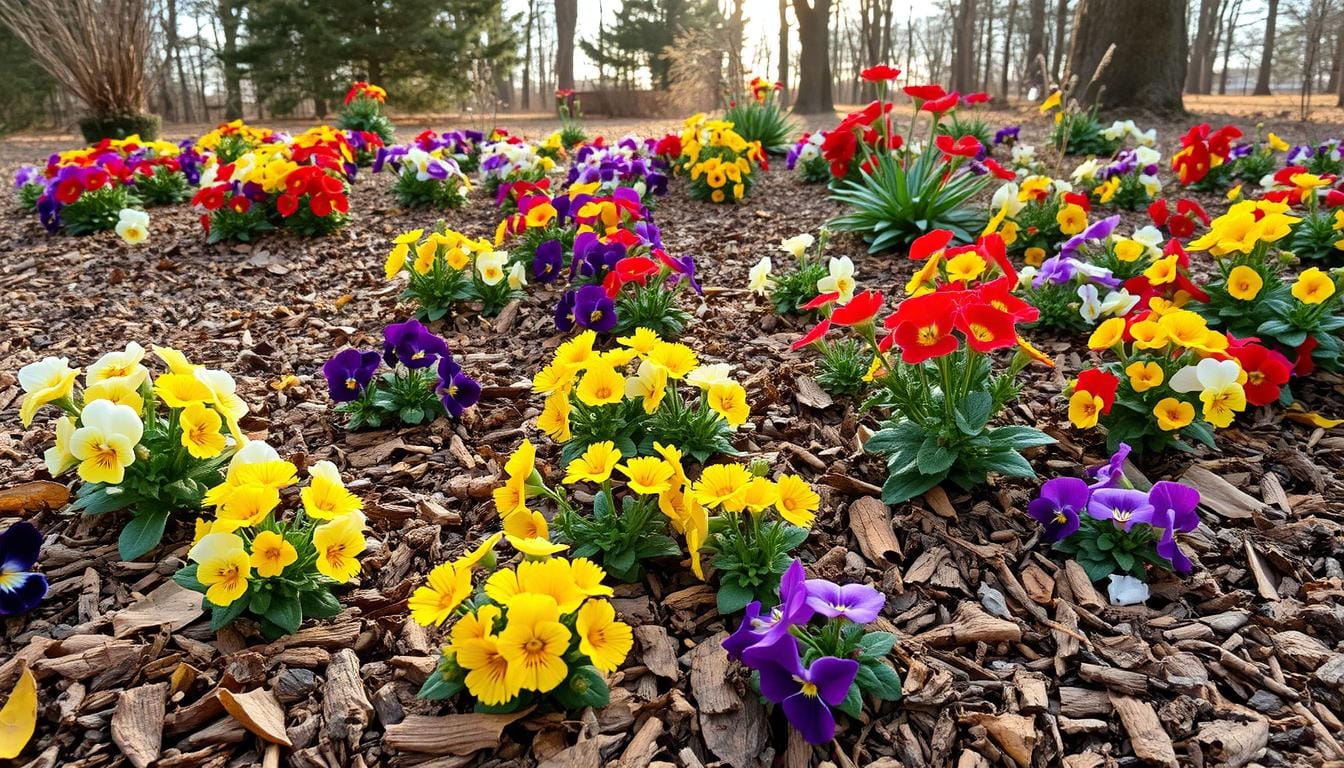
As autumn arrives in Georgia, gardeners must protect their gardens from winter’s cold. Yet, this season offers a chance to make a garden that blooms all year. The key is using organic mulch and choosing flowers that can handle the cold.
Organic mulch is a gardener’s ally. It keeps roots warm, holds moisture, and stops weeds. A 2-4 inch layer around plants shields them from cold temperatures and strong winds. This simple action can greatly help your garden survive and grow in winter.
Choosing the right flowers for winter is where the magic happens. Pansies can bloom for up to eight months, and hydrangeas do well in different soils. With the right mulch and flowers, your garden can be a colorful delight all winter long.
Table of Contents
Understanding Winter Gardening in Georgia’s Climate
Gardening in Georgia’s winter needs a good grasp of the state’s varied weather. Atlanta is in USDA zones 7b-8a, but temperatures can change a lot. Knowing these changes is key for growing cold-hardy flowers georgia and keeping winter flower beds georgia lively.
Georgia’s Winter Temperature Patterns
Georgia’s winters are full of surprises. You might have sunny days then cold nights. This makes it hard for georgia winter gardening tips to work. It’s important to pick plants that can handle these changes.
Impact of Climate Zones on Winter Flowers
Georgia’s different climate zones affect winter flowers a lot. Some plants love the cold and use winter pollinators. Others prefer warmer weather and rest during the cold. Knowing this helps create beautiful winter gardens.
Typical Winter Growing Conditions
Georgia’s winters are a mix of mild and unpredictable weather. You might see frost, heavy rain, or even snow. To keep winter gardens alive, use organic mulch and choose cold-hardy plants.
Benefits of Organic Mulch for Winter Flower Protection
If you garden in Georgia, organic mulching can change the game for your winter flowers. Organic mulching georgia offers many benefits that help your blooms flourish in the cold.
One big plus of mulched flower beds georgia is keeping temperatures steady. Organic mulch protects plant roots from extreme temperatures. This stops frost heaving, which can harm your plants. It also keeps soil moist, so you don’t have to water as often.
As the mulch breaks down, it adds nutrients to the soil. This gives your best mulch for winter flowers georgia a springtime boost. Plus, it keeps weeds away, so your flowers get all the nutrients they need.
“Mulching flower beds during winter reduces the risk of frost heaving, which can help maintain plant health and decrease plant loss by up to 40%.”
Organic mulch also makes soil more stable. Flower beds with a lot of mulch are less likely to wash away. Mulches like cedar, pinewood, and cypress wood chips can even cut down pest problems by 60%.
In summary, organic mulching is great for protecting winter flowers. It insulates, keeps moisture in, suppresses weeds, and enriches the soil. Organic mulching georgia ensures your winter blooms thrive and your garden stays beautiful.
Flowers to Plant in Organic Mulch During Winter in Georgia
As winter comes to Georgia, gardeners can grow many vibrant flowers. Planting these in organic mulch makes a stunning winter garden. This adds color and life to your outdoor spaces. Here are the best flowers for your Georgia winter garden:
Early Winter Blooming Varieties
- Pansies: Pansies are a favorite in Georgia’s winter. They need well-drained soil and a slightly acidic pH. They can handle short cold snaps with the right mulch.
- Violas: Violas are similar to pansies but smaller. They add a delicate charm to your garden.
- Ornamental Cabbages: These plants have unique leaves in purple, pink, and white. They add texture and interest to winter landscapes.
Mid-Winter Flowering Options
- Hellebores: Known as “Lenten roses,” hellebores bloom long in Georgia’s mild winters. Their colorful blooms are a stunning addition to your garden.
- Winter Jasmine: This shrub has bright yellow flowers and a lovely scent. It adds color and fragrance to your winter garden.
- Camellias: These evergreen shrubs have large, showy blooms in winter. They contrast beautifully with organic mulch.
Late Winter Bloomers
- Daffodils: These flowers are among the first signs of spring in Georgia. Planting daffodil bulbs in organic mulch lets them bloom in late winter.
- Crocuses: These small flowers are among the first to bloom in spring. They thrive in organic mulch during Georgia’s winter.
- Snowdrops: These delicate white flowers signal spring’s arrival. They are a lovely addition to your late winter garden.
By planting a variety of cold-hardy flowers, your winter garden will be vibrant and changing. Always keep organic mulch around your plants for insulation and protection.
Best Organic Mulch Types for Winter Flower Beds
Choosing the right organic mulch is key for winter flower beds in Georgia. It keeps plants warm, holds moisture, and improves soil quality.
Wood chips are a top pick for winter flower beds. They soak up sunlight, keeping soil warm. Plus, they break down, adding nutrients to the soil.
Straw is another great option. It’s light, keeps soil warm, and stops weeds. It’s also easy to find and affordable for Georgia gardeners.
- Shredded leaves are perfect for mulching. They keep plants warm and add nutrients as they decompose.
- Pine straw is a favorite in Georgia. It insulates well and looks nice.
It’s crucial to pick high-quality mulch without diseases or chemicals. Bad mulch can harm your garden. The right mulch helps your winter flowers grow well, even in cold weather.
| Organic Mulch Type | Benefits for Winter Flower Beds | Drawbacks |
|---|---|---|
| Wood Chips | Insulation, moisture retention, gradual soil enrichment | May need to be reapplied every 1-2 years |
| Straw | Insulation, moisture retention, weed suppression | Can be unsightly if not maintained |
| Shredded Leaves | Insulation, gradual soil enrichment | May need to be reapplied annually |
| Pine Straw | Insulation, natural appearance | Requires a thicker layer (3-4 inches) for effective weed suppression |
Choosing the right organic mulch is essential for winter flower beds in Georgia. It protects and supports your plants during the cold months.
Native Winter-Blooming Flowers for Georgia Gardens
As winter approaches in Georgia, it’s time to look at native winter flowers. These plants are made for Georgia’s weather. They bring color and texture to your garden even when it’s cold. Adding native winter bloomers to your garden makes it beautiful all year with little work.
Perennial Native Options
Georgia’s climate is great for many perennial native flowers that bloom in winter. Some top picks are:
- Hellebores (Helleborus spp.): Known as “winter roses,” these plants have delicate, cup-shaped flowers in white, pink, and purple.
- Trilliums (Trillium spp.): These flowers have three petals in white, red, and purple. They love shady spots.
- Hepatica (Hepatica nobilis): Hepaticas have anemone-like flowers. They add a whimsical touch to winter gardens in Georgia.
Annual Native Choices
For a splash of color in winter, Georgia’s native annual flowers are perfect. Two great choices are:
- Georgia Aster (Symphyotrichum georgianum): This flower looks like a daisy and loves the sun. It adds a cheerful touch to winter gardens.
- Annual Phlox (Phlox drummondii): Annual phlox grows like a carpet and comes in many colors. It’s great for adding interest to your winter garden.
These native winter flowers make your garden look better. They also help local wildlife like butterflies, bees, and birds. By adding them, you support Georgia’s natural beauty and help the local ecosystem.
Winter-Hardy Flowering Shrubs and Small Trees
In Georgia, when it gets cold, you can still brighten up your garden. There are many winter-hardy flowering shrubs and small trees that can add color and structure. These plants can handle the state’s chilly weather, offering beauty through their blooms, berries, or bark.
Camellias are a classic choice in the South, blooming from late fall to early spring. Witch hazel and winter jasmine also do well, with their yellow flowers adding cheer. Winterberry holly stands out with its red berries, making the garden pop.
If you want something to signal spring, try the Higan cherry. It blooms with pink flowers as early as February, hinting at warmer days ahead.
Looking to enhance your winter flower beds georgia with cold-hardy flowers georgia and small trees? They’re perfect for georgia winter gardening tips. With the right care, they can make your garden beautiful all year.
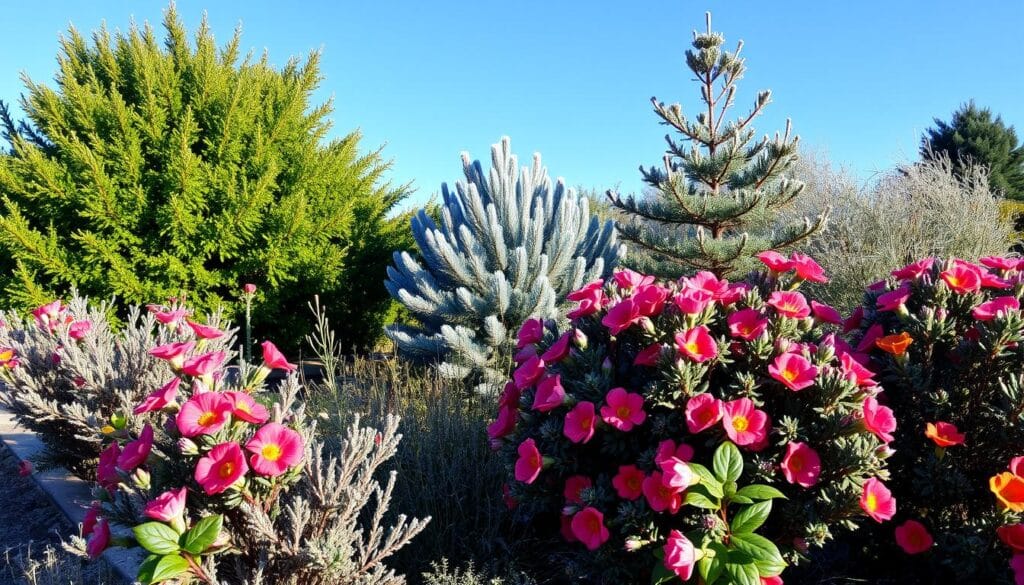
“The true secret of happiness lies in taking a genuine interest in all the details of daily life.” – William Morris
Proper Mulching Techniques for Winter Protection
Keeping your garden healthy in Georgia’s winter needs careful mulching. Using the right organic mulch at the correct depth is key. It protects your winter flowers and keeps them looking vibrant even in cold weather.
Mulch Application Methods
To mulch your flower beds for winter, aim for a 2 to 4 inch layer. Use materials like wood chips, shredded bark, pine needles, or decomposed leaves. Make sure to leave a gap of a few inches from plant stems to avoid moisture issues.
Maintaining Proper Mulch Depth
The mulch depth is vital for winter protection. A 2 to 4 inch layer insulates the soil, keeps moisture in, and stops weeds. Check your mulched beds often and add more when needed, especially after rain or when the mulch breaks down. A fresh layer before the first winter freeze is best for your Georgia flower beds.
By using these mulching tips, your winter garden in Georgia will flourish. Proper mulching is essential for growing beautiful winter flowers in Georgia.
Common Winter Flowering Bulbs for Georgia Gardens
In Georgia, gardeners can brighten their spaces with winter flowering bulbs as the weather cools. Snowdrops, winter aconite, crocus, and daffodils are great choices. They thrive in the state’s climate and can come back year after year with the right care and mulching.
Snowdrops (Galanthus) are among the first to bloom, showing off white flowers in late January or February. They love shady spots and are a lovely sight after winter. Winter aconite (Eranthis) blooms around the same time, adding yellow flowers to the mix.
Crocus bulbs bring vibrant colors like purple, white, and yellow to your garden. They’re among the first to signal spring’s arrival. Daffodils (Narcissus) also bloom in late winter to early spring, with their famous trumpet-shaped flowers.
“These winter-flowering bulbs are a true delight, bringing much-needed color and life to the garden during the colder months in Georgia.”
Plant your bulbs in the fall, from October to November. Make sure the soil is well-drained and gets enough sun or shade. Mulching helps protect them from frost and keeps the soil moist. With a bit of care, these bulbs will brighten your garden every winter.
Maintaining Winter Flowers in Mulched Beds
As winter comes, your flower beds need extra care. Watering and pest control are key to keeping them alive. This is especially true for mulched flower beds in Georgia during the cold months.
Watering Schedule
Mulch helps keep soil moist, but your plants still need water. In dry times, you might need to water them yourself. Water deeply a few times a month to keep the roots healthy.
Winter Pest Control
Watch for pests like deer, rabbits, and insects in your beds. Use organic methods to fight them off. Some plants, like hellebores, resist pests well.
By keeping an eye on your garden and following these tips, you can have a beautiful winter garden. Your mulched flower beds georgia will stay vibrant and healthy. This will make your garden a lovely georgia winter gardening tips spot, even in the cold.
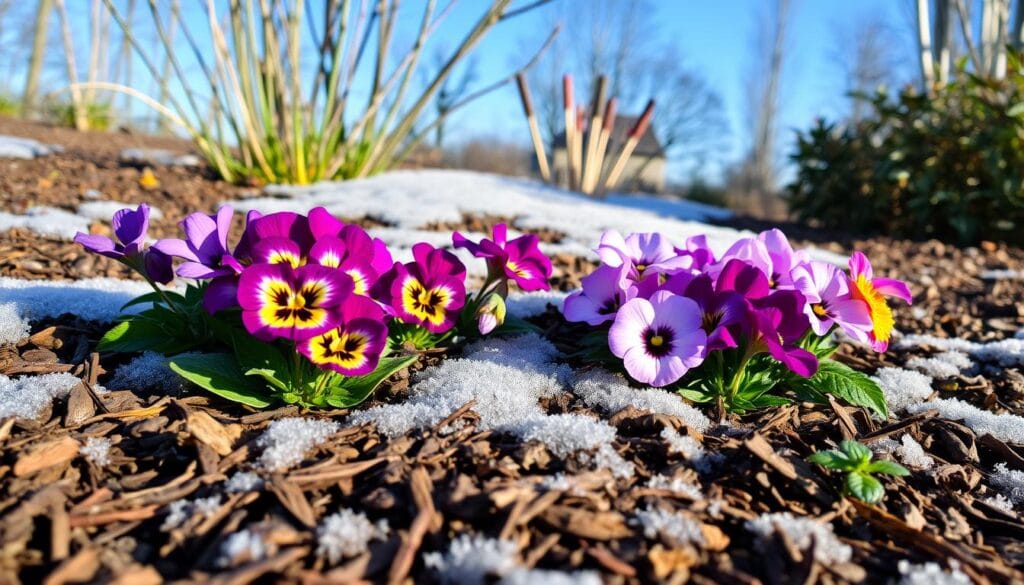
Color Planning for Winter Garden Displays
As winter in Georgia gets colder, planning colors can make your garden pop. Mix plants with different bloom times for a colorful season. Add plants with colorful leaves, berries, or bark for more interest.
Ornamental cabbages and kales add cool textures and colors. Evergreen plants like holly and boxwoods keep your garden looking good all year. A mix of winter flowers, foliage, and evergreens makes a beautiful winter garden in Georgia.
Achieving Color Continuity
For a garden that stays colorful, pick plants that bloom at different times. This way, your garden will always have something new to see. Plant a mix of early, mid, and late bloomers, like:
- Early-winter bloomers: Pansies, violas, Lenten roses
- Mid-winter bloomers: Camellias, hellebores, cyclamens
- Late-winter bloomers: Daffodils, crocus, snowdrops
Choosing plants with colors that go well together makes your winter garden a hit. It will impress you and your neighbors all winter long.
“The winter garden can be as beautiful as any other season, with the right planning and selection of plants.” – Georgia Horticulturist, Jane Doe
For a great winter garden in Georgia, mix different plants for color and interest. Flowers, foliage, and evergreens together make a stunning landscape. It will be the talk of the town.
Winter Flower Bed Design Strategies
As winter arrives in Georgia, gardeners focus on designing flower beds for the season. They mix plants of different heights, textures, and bloom times. This creates a beautiful winter garden that looks great even when it’s cold.
Start with evergreen shrubs or small trees as a base. They provide a lush look all year. Then, add winter-blooming perennials and annuals on top. This layered design adds depth and interest, even when plants are dormant.
Think about using raised beds or berms for better drainage and soil. This helps your winter flowers grow well. Also, add stone walls or garden art for beauty and function in your winter landscape.
- Use a mix of plants for height, texture, and bloom times.
- Evergreen shrubs or small trees make a great backdrop.
- Raised beds or berms improve drainage and soil.
- Stone walls or garden art add interest all year.
- Choose durable materials like granite or treated concrete for hardscaping.
Designing your winter flower beds in Georgia can create a beautiful landscape all year. It showcases nature’s beauty and supports pollinators and wildlife in the cold months. Embrace the challenges of winter gardening in Georgia and let your creativity show in your georgia winter gardening designs.
“Gardening is about enjoying the smell of things growing in the soil, getting dirty without feeling guilty, and generally taking the time to soak up a little peace and serenity.” – Lindley Karstens
Conclusion
Winter gardening in Georgia is a chance to make your garden lively, even when it’s cold. By picking the right flowers for organic mulch, you can create beautiful winter scenes. These scenes highlight the area’s tough yet lovely plants.
Organic mulch keeps soil moist, controls temperature, and adds nutrients. Using it right is key to a successful winter garden in Georgia. It protects plants and helps them grow well. With the right mulching and garden design, your winter garden will be amazing.
Winter gardening in Georgia is for everyone, whether you’re new or experienced. Using flowers to plant in organic mulch during winter in georgia, winter gardening georgia, and organic mulching georgia can turn your yard into a winter wonderland. With the right plants and mulch, your garden will stay warm and colorful, even when it’s cold.
FAQ
What are the best flowers to plant in organic mulch during the winter in Georgia?
How does Georgia’s winter climate impact winter gardening?
What are the benefits of using organic mulch for winter flower protection?
What are some of the best organic mulch types for winter flower beds in Georgia?
What are some native winter-blooming flowers that thrive in Georgia’s climate?
What are some winter-hardy flowering shrubs and small trees that can add color to Georgia gardens?
What are the proper mulching techniques for winter flower protection?
What are some common winter flowering bulbs that can thrive in Georgia gardens?
How do you maintain winter flowers in mulched beds?
How can you create visually striking winter garden displays with color planning?
Source Links
- How to Grow Pansies for the Prettiest Cool-Season Color – https://www.bhg.com/gardening/flowers/annuals/how-to-select-and-grow-pansies/
- How to Mulch Hydrangeas: 12 Steps (with Pictures) – wikiHow – https://www.wikihow.com/Mulch-Hydrangeas
- Snapdragons add fall color and can withstand winter temperatures – https://newswire.caes.uga.edu/story/4570/hardy-snapdragons.html
- Cultivating Beauty: Winter Flowers in Georgia Unveiled – https://growingseed.biz.id/winter-flowers-in-georgia/
- Why Fall is the Perfect Time to Install Mulch and Pine Straw: A Guide by Mountain High Landscape Supply – https://mountainhighmulch.com/why-fall-is-the-perfect-time-to-install-mulch-and-pine-straw-a-guide-by-mountain-high-landscape-supply/
- 7 Fantastic Benefits of Mulching Flower Beds – Lumberjacks – https://lumberjax.com/mulching-flower-beds-benefits/
- ‘Mulch’ ado about nothing? Actually, it’s pretty important – https://www.lsuagcenter.com/articles/page1728504516948
- Plant pansies now for colorful flowers all winter – https://newswire.caes.uga.edu/story/4897/pansy-planting.html
- Why You Should Use Organic Mulch Instead Of Rubber – https://www.southernliving.com/garden/grumpy-gardener/organic-vs-rubber-mulch?srsltid=AfmBOopdxIL0c0uHW8jSSomxHFt4llx7LPdl41W54WSrc8BKIQI-yf8R
- Why You Should Use Organic Mulch Instead Of Rubber – https://www.southernliving.com/garden/grumpy-gardener/organic-vs-rubber-mulch?srsltid=AfmBOoqIO37X2wcyvSFN2I9nL4wI60HHr1GbD42saw_AHHEHAb7twjwp
- The Best Type of Mulch for Every Kind of Flower Bed – https://www.veranda.com/outdoor-garden/g60559252/best-mulch-for-flower-beds/
- 10 Low-Maintenance Perennials to Add to Your Garden This Spring, Acworth, GA – https://www.thedreamscapes.com/blog/10-low-maintenance-perennials-to-add-to-your-garden-this-spring
- Your Georgia Garden in May | A Cook And Her Books – https://acookandherbooks.com/your-may-garden-in-georgia/
- 11 Low-Maintenance Landscaping Ideas for Atlanta – https://lawnlove.com/blog/low-maintenance-landscaping-atlanta/
- 14 Best Trees to Plant in Atlanta, GA – https://www.lawnstarter.com/blog/georgia/atlanta-ga/best-trees-atlanta/
- How To Grow And Care For Paper Bush (Edgeworthia Chrysantha) – https://www.southernliving.com/garden/grumpy-gardener/plant-a-paper-bush?srsltid=AfmBOoruijAj0TEHM0RlheLL0i2YomIUdnsSEYmAf3hgJ07-YeDieJmj
- Types of Mulch and Why You Should Use Them – https://www.thespruce.com/what-is-mulch-1402413
- The Ultimate Guide to Mulching: Transform Your Garden with the Power of Mulch – Fine Touch Services – https://finetouchservices.com/the-ultimate-guide-to-mulching-transform-your-garden-with-the-power-of-mulch/
- 20 Winter Flowers That Bloom in the Cold – https://www.lawnstarter.com/blog/landscaping/winter-flowers-that-bloom-in-cold/
- Blooming Beauties: A Guide to Planting Spring Flowers in Georgia in 2024 – StoneCreek Landscaping | Landscaping & Lawn Maintenance Marietta, GA – https://stonecreekga.com/2024/02/23/blooming-beauties-a-guide-to-planting-spring-flowers-in-georgia-in-2024/
- How to Winterize a Garden (in 12 Easy Steps) – LawnStarter – https://www.lawnstarter.com/blog/landscaping/how-to-winterize-a-garden/
- Strategic Winter Garden Preparation Techniques – https://gloverlandscapes.com/winter-garden-preparation-techniques/
- Unlimited Lawn Care – https://www.unlimitedlawncare.com/about/our-blog/benefits-fall-mulching
- 32 Landscaping Ideas For Your Yard That You’ll Cherish In Every Season – https://www.southernliving.com/garden/10-best-yard-landscaping-ideas?srsltid=AfmBOoqfgSyzdf8qgnMo5ovy4wawM_knclhIWuGVgRJeI78E7OoHzazu
- Discover the Diversity of Winter Flowers in Georgia – https://seedsquad.biz.id/winter-flowers-in-georgia/
- 10 Tips for Preparing Your Garden for Winter – https://www.almanac.com/10-tips-preparing-your-garden-winter
- Zone 7 – Monthly Garden Calendar: Chores and Planting Guide – https://sowtrueseed.com/blogs/monthly-garden-schedule-by-zone/zone-7-monthly-garden-calendar-chores-and-planting-guide?srsltid=AfmBOorMk1In9hsHInb5VtGBVpc-59EddEgLdypELdf_o8XpuC0nBVfS
- Growing Winter Garden Plants: A Complete Guide – https://kissanshop.com/winter-garden-plants/
- The Benefits of Bark Mulch for Your Garden: A Comprehensive Guide | Allwood Recyclers Inc – https://www.allwoodrecyclersinc.com/the-benefits-of-bark-mulch-for-your-garden-a-comprehensive-guide/
- Top 5 Beginner-Friendly Winter Cover Crops – https://www.bootstrapfarmer.com/blogs/backyard-gardening/beginner-friendly-winter-cover-crops?srsltid=AfmBOoqYB9LZcn0LMUePcx2TbVbBKnQLdQD0CQ8ciqftaIGw90v1Ps92
There are no reviews yet. Be the first one to write one.

